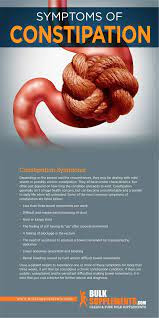.jpg) Constipation is a common digestive disorder characterized by difficult or infrequent bowel movements. There are many potential causes of constipation, including diet, lifestyle, and medications. In some cases, constipation may be caused by an underlying medical condition. Treatment for constipation typically involves lifestyle modifications, such as increasing dietary fiber and exercise, as well as medications.
Constipation is a common digestive disorder characterized by difficult or infrequent bowel movements. There are many potential causes of constipation, including diet, lifestyle, and medications. In some cases, constipation may be caused by an underlying medical condition. Treatment for constipation typically involves lifestyle modifications, such as increasing dietary fiber and exercise, as well as medications.Common causes of constipation include inadequate dietary fiber intake, inadequate water intake, certain medications, inactivity, and changes in routine. Inadequate dietary fiber intake is one of the most common causes of constipation, as fiber helps to keep stools soft and regular. Not drinking enough water can also cause constipation, as this can lead to dehydration and a build-up of waste in the digestive system. Certain medications, such as laxatives, antacids, and some pain medications, can also cause constipation. Additionally, not getting enough physical activity can lead to constipation, as exercise can help to stimulate the digestive system. Finally, changes in routine, like travelling, can disrupt the digestive system and cause constipation.
Treatment for constipation typically involves lifestyle modifications, such as increasing dietary fiber and water intake, exercising regularly, and maintaining regular bathroom habits. Increasing the amount of dietary fiber in the diet is the most common treatment for constipation. Dietary fiber helps to keep stools soft and regular, and can be found in many foods, including fruits, vegetables, legumes, and whole grains. Drinking plenty of water can also help to keep the digestive system functioning properly. Regular physical activity can also help to stimulate the digestive system, and maintaining regular bathroom habits can help to keep the digestive system on track.
In some cases, medications may be necessary to treat constipation. Osmotic laxatives, which draw water into the intestines to soften stools, are often used to treat constipation. Stimulant laxatives, which stimulate the muscles of the intestines to contract and move waste through the digestive system, can also be used to treat constipation. If constipation is caused by an underlying medical condition, medications to treat that condition may also be prescribed.
In summary, constipation is a common digestive disorder that can have many potential causes, including diet, lifestyle, and medications. Treatment typically involves lifestyle modifications, such as increasing dietary fiber and exercise, as well as medications. It is important to speak with a doctor if home treatments are not successful in relieving constipation.
